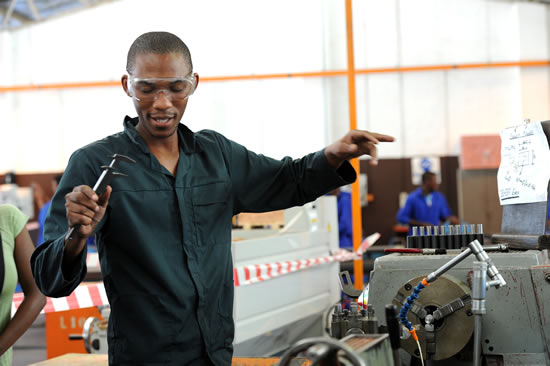The Department of Basic Education’s (DBE) technical secondary schools recapitalisation conditional grant is starting to bare fruit.
 The grant aims to encourage high school learners to be artisans by providing infrastructure, such as workshops, to technical schools around the country.
The grant aims to encourage high school learners to be artisans by providing infrastructure, such as workshops, to technical schools around the country.
Elliotdale Technical and Commercial Senior Secondary is a recent recipient of the programme. The school received four state-of-the-art workshops for mechanical, electrical, civil technology and engineering graphics and design.
Lungile Ndayi the school’s principal said teaching and learning has improved since the workshops were built.
He added that learners are more enthusiastic to learn the theory and the practical application of their studies.
“In the past we would conduct the theory and the practical in one classroom. There was not enough space, which meant that students would be squashed in one room.”
“The students now have a fully-fledged workshop where they can conduct their practical learning.”
Ndayi added that there is a high demand for technical skills in the area.
“The school is already full in terms of taking in new students for the 2016 academic year.”
It currently has 805 learners from Grade 10 to 12.
Pupils have to do six subjects at the school including mathematics, languages, sciences and commercial subjects.
“They have to choose one technical subject until they reach matric.”
He added that his school had produced six qualified civil engineers who developed an interest in the built environment while they were at the school.
“We are aware that the country needs artisans and civil engineers. As educators we are doing our best to encourage students to this sector.”
Ndayi added that as a way of developing artisans his school was working with uMthatha Technical College to have evening classes at the school, even beyond matric level.
“Most of the learners that come to this schools are from poor rural areas. Once a learner has completed matric the chance of continuing with their studies is very small.
“Learners would be interested in evening classes for artisans at the school as they would not have to travel to the city for education.”
Enoch Mchiza, project coordinator for the technical secondary schools recapitalisation grant at the DBE, emphasised the importance of technical education.
“Learners also receive assistance in mastering technical skills and they are equipped with entrepreneurial skills.”
He added that technical education enhanced engineering principles for learners who would like to enrol in the engineering fields.
A total of 112 new workshops were built and 447 workshops were refurbished; 538 workshops received new equipment, tools and machinery and 3194 teachers were trained in different parts of the country, as part of the grant.
The department also revised the curriculum for technical schools to introduce areas of specialisation in mechanical, electrical and civil technology.
This included the introduction of technical maths and science, to strengthen the technical education pathway.
Through the Technical Secondary Schools Recapital-isation Conditional Grant:
- 3 194 teachers were trained across the country.
- 538 workshops received new equipment.
- 447 workshops were refurbished.
- 112 workshops were built.
Year of the artisan campaign showing results
Since 2012 the Department of Higher Education and Training (DHET) has helda nation-wide campaign, the Decade of the Artisan, to encourage young people to join the sector.
More than 28 000 young people registered to be artisans during the 2014/15 financial year, with more than 14 000 learners completing artisan-related learning programmes.
The Decade of the Artisan campaign seeks to promote artisanry as a career of choice to the youth within the post-school education and training system and highlight skills development opportunities.
According to the DHET more than 28 000 young people registered to be artisans during the 2014/15 financial year, with more than 14 000 learners completing artisan-related learning programmes.
Gauteng had the highest number of learners registering with 9158, followed by KwaZulu-Natal with 2851.
Accoring to DHET the average age of artisans is 55 and the population is ageing.
For more information about becoming an artisan call 011 206 1000 or the National Artisan Development Support Centre on 011 736 4400. Visit the website www.nadsc.dhet.gov.za



 Facebook
Facebook Twitter
Twitter WhatsApp
WhatsApp